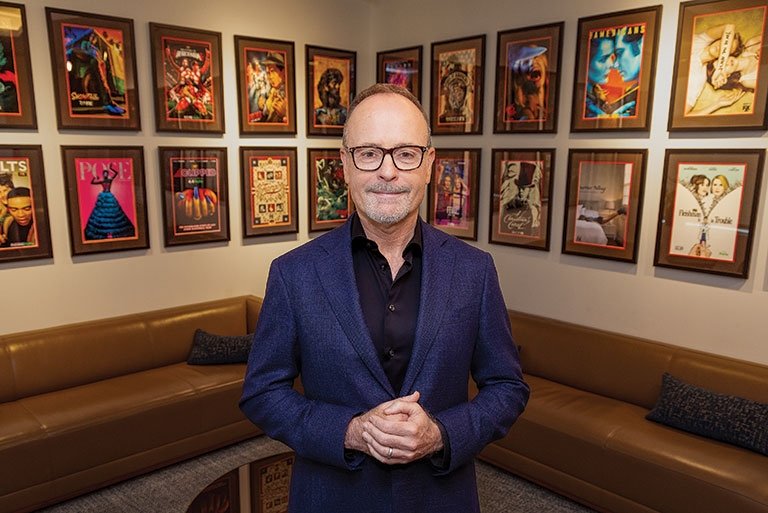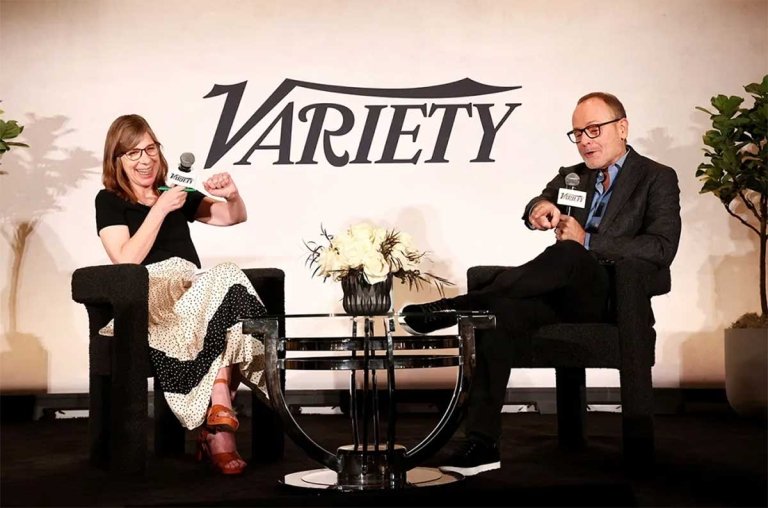Thinking Outside the Box (Office)
Is anything possible with a liberal arts degree? FX Chief John Landgraf ’84 thinks so.

John Landgraf ’84 has space aliens on his mind.
One of the big shows that his network, FX, launched in late summer was “Alien: Earth,” an eagerly anticipated reboot of the space horror franchise that appeared in 1979 about Sigourney Weaver’s chilling showdown with a terrifying alien in deep space. With showrunner Noah Hawley (“Fargo”) at the helm, the show has enjoyed much critical acclaim, and Landgraf is thrilled not just as an exec but as a creative. It’s given him and his team a chance to get involved in an exciting genre that’s new to him.
“I liked the ‘Alien’ franchise, but it was never something I expected to work on. I’ve never worked in that genre before,” said Landgraf, 63, the chairman of FX Content and FX Productions. “But doing something different and just seeing what’s possible has always interested me. You can limit yourself at the beginning of your career and say everything that you do must stay inside the box, but what I’ve found over and over again is that you can blow the walls off that box.”
“Blow the walls off that box”: That phrase could be turned into a fitting motto for Landgraf’s career.
Just prior to “Alien: Earth,” for instance, there was “Shōgun,” FX’s original limited series that re-envisions James Clavell’s epic novel (which was also made into a 1980 miniseries hit with Richard Chamberlain). Industry pundits thought it was a huge gamble—who’s going to watch a period piece set in medieval Japan?—and Landgraf and his team proved them all wrong. Again. Slate hailed the series as “a runaway hit” while Variety even dared to call it a “transportive epic” on the scale of HBO’s “Game of Thrones.”
"You can limit yourself from the beginning of your career and say everything that you do must stay inside the box, but what I've found over and over again is that you can blow the walls off that box."
Then there are the network’s other successes—including “The Bear,” “It’s Always Sunny in Philadelphia,” “Atlanta,” “Fargo,” among many—that Landgraf has been involved in since arriving at FX in 2004. In a recent Vanity Fair profile, the impact of his leadership is spelled out in no uncertain terms.
“In the two decades he has been at FX’s creative helm,” the profile said, “Landgraf has transformed it from a basic-cable network … into a singular brand that’s now the jewel in Disney’s crown.”
Prior to that, Landgraf’s professional experience included serving as a television programming executive for NBC during its “Must See TV” heyday. His success—and his knowledge of the medium—are so well known in the industry that it’s earned him the nickname, according to various outlets, of the Mayor of Television.
But here’s the thing about Mayor Landgraf: He didn’t reach this pinnacle with an undergraduate business degree in his pocket. Or an MBA. He studied anthropology at Pitzer. Looking back on his time spent in McConnell Dining Hall or joking around with his friends in Mead Hall, he said his life now is a far cry from what he imagined then.
“I didn’t have a clue what I was going to do with my major after I graduated,” he said. “I just learned everything I could, and I fortunately found a profession in which almost everything I’ve ever learned has found some kind of application. When you work with storytellers, everything comes up for discussion. It turned out to be the best education I could have ever gotten.”
With critics of higher education asking whether a liberal arts degree is worthwhile or not—translation: Will this get students good jobs?—Landgraf’s career makes an elegant argument that it is. Though Pitzer (and Claremont) might be on the periphery of SoCal’s entertainment industry, important things happened on the College’s 35 acres that played a consequential part in his future.
Last-Minute Plans
It’s been 40 years since Landgraf sat in her classroom, but Emerita Anthropology Professor Sheryl Miller still remembers his intellectual seriousness and yearning to create a meaningful life. She said he was like many students at that age who struggle to find a purpose. But, she added, there was something different about him, too.
“During my office hours, we’d talk about anthropology, the world, life in general,” she recalled. “I sometimes felt as if John and I were exchanging ideas the way one does with a colleague, not an undergraduate student.”
Maybe that precocious gravitas was inherited from his parents, both of whom received graduate degrees (a doctorate in marriage and family counseling from Claremont Graduate School for his father, a master’s in social work for his mother from Arizona State University).
Born in Detroit, Michigan, Landgraf describes his parents as a “a pair of itinerant musicians” whose wanderings eventually brought them to Southern California’s San Gabriel Valley. He said his family was constantly in motion; later, after his parents’ marriage ended, Landgraf was on the move again. He said he shuttled between his parents’ homes before finally settling with his father.
His arrival at Pitzer was unexpected: The College’s late acceptance of applications saved hm when his other plans didn’t work out. Though he thought he’d transfer somewhere else when he had a chance, Landgraf changed his mind as soon as new student orientation started. The small, intimate atmosphere on campus surprised and pleased him. He remembers faculty discussing the nature of autocracy (a topic, it seems, that never goes out of style), and there was a stage reading of Orwell’s 1984. The intellectual climate stimulated him. So did the campus’ intimacy—he was impressed with the way professors wanted to know what he thought.
He decided to stay.
“The idea of small classes and the Socratic method and direct access to faculty on a first-name basis was completely new to me. It was a radical departure, and I really thrived in it,” he said. “Pitzer turned out to be the right school and place for me.”
The Pitzer Difference
The chair of an entertainment network needs the kind of corporate toolkit that would seem impossible for any single person to possess. Not only does this person build relationships with stakeholders and provide the kinds of oversight that will keep everyone on track, there’s a creative part, too.
In hindsight, the liberal arts education Landgraf received at Pitzer prepared him for much of it.
He points to the College’s special approach to governance for introducing him to the ways that large organizations function. Pitzer’s highly participatory approach in many of its committees meant that an 18- or 19-year-old suddenly found a place at the table.
In Landgraf’s case, that opportunity came via being a convenor of students, a role that had him acting as a liaison between his peers and the College’s administration. He also became a student representative to the Faculty Executive Committee, which is charged with making the College’s final academic policy decisions. Thanks to experiences like these, Landgraf often found himself, as the musical Hamilton puts it, in “the room where it happened.”
“My involvement with the College’s leadership was nothing like I’d ever dreamed about or thought possible,” he said. “To have this kind of access and visibility was so unique. If I’d gone to a much larger school, I’d have had zero visibility into the governance structure. It was the participatory structure at Pitzer that created opportunities for me to learn that I wouldn’t have found anywhere else.”
"To have this kind of access and visibility was so unique. If I'd gone to a much larger school, I'd have had zero visibility into the governance structure. It was the participatory structure at Pitzer that created opportunities for me to learn that I wouldn't have found anywhere else."
What Pitzer also gave him—besides a unique understanding of governance—was an abundance of mentors. One of them turned out to be Frank Ellsworth, the College’s third president from 1979 to 1991.
Ellsworth opened his home to Landgraf and other first-year seminar students, and they engaged in spirited discussions about the nature of equality and what primary sources say about it. It was Ellsworth who saw Landgraf as potentially the College’s first Rhodes Scholar and took him under his wing; Miller was another important mentor who inspired Landgraf to consider anthropology as a major.
To this day, he remembers their impact on him in the fondest terms.
“They were filled with joy and mirth and curiosity and good humor, and their passion for their subjects was infectious,” he said. “Instead of being taskmasters pounding information into you, they were more like tour guides, saying, ‘I live in Rome, can I show you what I know?’ There was always an unfettered sense of joyful curiosity in their classes. They were just inspiring to me.”
When his Rhodes aspiration didn’t work out—Landgraf did become California’s finalist, though—another mentor stepped in with a decisive suggestion. Lucian Marquis, a longtime professor of political studies, pointed Landgraf in the direction of Coro, a respected nonprofit organization that provides fellowships in leadership and public affairs. Landgraf was selected as a Coro fellow, and the fellowship gave him more of what he enjoyed—insights into how various organizations operate.
Landgraf spent his Coro fellowship in various high-level internships with organizations including the California Association of Realtors and the Los Angeles Department of Water & Power. When one of his internships took place at a small production company that supported ad agencies and public relations firms, it was his first taste of the entertainment business. That taste excited him enough to keep at it for three years until he found a more permanent entry into the industry.
That entry came thanks to another Pitzer connection, Joel Fields ’85, one of Landgraf’s former classmates who was already in the business. Even though Pitzer, in the 1980s, didn’t yet have an alumni network in the entertainment industry, all Landgraf needed was his friendship with Fields (who would later work with Landgraf as the co-showrunner for FX’s “The Americans”). Fields connected Landgraf with acclaimed screenwriter, director, and film/television producer David Manson, who had started his own company, Sarabande Productions, as a platform for storytellers with a distinct literary flavor. Landgraf was hired. He was on his way.
“Honestly, recommending John for that job with David was about the easiest thing I ever did in my life,” Fields recalled. “I was supposed to go to work for David after college, but due to the timing of one of his films, by the time the job was open I was unavailable. I knew John. I knew David. I knew it would be a great thing for them both.”
Entertainment and Anthropology
When he describes the steps in his subsequent career—moving from Sarabande to NBC, becoming a partner with Jersey Television (Danny DeVito’s production company), arriving at FX—Landgraf continually returns to what he learned at Pitzer.
“I would say my whole career has been one in applied anthropology,” he said. “Running an organization, working with so many incredible creators, and building a culture of excellence that’s embedded in other corporate cultures with broader goals—to me, all of it is anthropology.”

Working for Sarabande was a crucial early step in his journey. Because the production company was small, Landgraf said it gave him opportunities—like Pitzer did—to get involved in processes and decisions that a larger company with a rigid hierarchy might never have allowed. As a development executive, he became steeped in everything, from working with writers to post-production, all with Manson’s encouragement.
“David told me to go work on the set and run postproduction, and I learned so much from him,” he said.
Asked if he regrets not studying business before embarking on his career, Landgraf shakes his head. He doesn’t think studying the liberal arts put him at a disadvantage. In fact, the opposite is true: He said it taught him adaptability and flexibility. With every new company and new role, he acquired new skills and understandings that helped him evolve and prepared him, in his 40s, to lead FX, which hit all-time highs in revenues and profitability under the ownership of 21st Century Fox (FX was later acquired by Disney as part of its purchase of the conglomerate) after his arrival.
This, in turn, made him realize the ongoing validity of a liberal arts education even amid today’s naysayers who think studying these areas is a waste of time with no utilitarian value. Beyond specific skills, he said, what matters most is having a passion for something.
“I have nothing against someone wanting to learn a specific skillset in college,” Landgraf said, “but I’ve found in my life that all the technical stuff is much easier to learn than the bigger issues. That requires a bigger exposure to all of human experience, the kind of thing I learned at Pitzer.”
Staying Curious
Even now, feted by Variety, Vanity Fair, and other publications, Landgraf stays true to his anthropological interests as much as his career will allow.
He’s still an intense student of the field’s important texts—currently he’s reading E.O. Wilson’s The Social Conquest of the Earth and Ruth E. Kastner’s Understanding Our Unseen Reality—and on his morning drive from Santa Monica (where he lives with his wife, actress Ally Walker, and their family) to the FX offices he catches up on news listening to The Daily or The Ezra Klein Show.
What many in past interviews and profiles have said about Landgraf’s intellectual poise comports with his demeanor for this The Participant interview. He’s thoughtful and measured in his comments. When he talks about understanding organizations, he might pivot suddenly to discuss the differences between societies organized in “patrilineal” or “matrilineal” ways. In the end, he doesn’t sound like your stereotypical executive—he sounds more like a professor.
The same is true of his office, which is simply furnished and seems like one you’d find down a corridor in Scott Hall. A life as a professor, in fact, was something he said he had contemplated if his entertainment career hadn’t worked out.
“I thought my odds of succeeding in Hollywood might be low, so I figured I would go back and get a doctorate,” he said. “But I was fortunate. My odds turned out to be much better than I thought.”
For Sheryl Miller, his former mentor, Landgraf’s success comes as no surprise.
“John has gone into a career that has made good use of his intellect and creativity,” she said. “I always felt that John would make a significant contribution to his generation, whether it was through the arts, social service, or philosophy.”
For Miller, in other words, Langraf’s odds of success were never low.
An Abundance of Mentors

Of their impact on him, John Landgraf said: “They were filled with joy and mirth and curiosity and good humor, and their passion for their subjects was infectious. Instead of being taskmasters pounding information into you, they were more like tour guides, saying, ‘I live in Rome, can I show you what I know?’ There was always an unfettered sense of joyful curiosity in their classes. They were just inspiring to me.”
John Landgraff '84 Bio in Brief
Birthplace: Detroit, Michigan
Age: 63
Spouse: Ally Walker
Children: 3
Pitzer major: Anthropology
Current position: Chair of FX
News Information
Published
Author
Nick Owchar
Organization
- Communications


